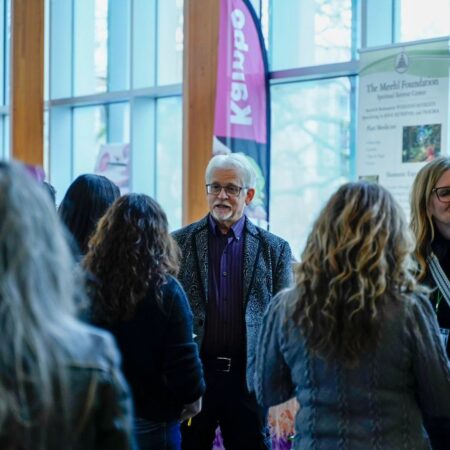
Features
Opinion
Events
Psychedelics
Mark Haden and Gabor Maté talk the bright side of psychedelics
Spirit Plant Medicine Conference is an annual gathering at UBC's Vancouver campus that offers a space for cultural exploration, spiritual insight and personal growth
November 10, 2023 By Haley Nagasaki
 Dr. Gabor Maté, 'Psychedelics: The good, the bad and the ugly" Photo: Marc Caron, SPMC
Dr. Gabor Maté, 'Psychedelics: The good, the bad and the ugly" Photo: Marc Caron, SPMC With the vulnerability and deep traditional history of psychedelics, comes the entrenched topics of appropriate conduct and interpersonal relationships while tripping, cultural appropriation, potential risks associated with pre-existing conditions such as schizophrenia, in addition to that which may arise during the thinning of the veil between realms — all of which warrants cautious optimism before, during and after using substances that this group would agree house spirits of their own.
The annual Spirit Plant Medicine Conference returned to UBC this month, providing an in-depth experience for attendees in person and online.
Visionary artists, musicians, doctors and guides, authors, researchers and activists filled the agenda, from all walks and many regions of the globe; the common theme: working with entheogens in our complex social landscape. The guidance gifted to listeners might assist navigating other realms with safety, integrity and humble enlightenment. The notion of oneness surfaced again and again as the individual uses consciousness as a vehicle often to discover that the one is part of the larger whole.

Mark Haden. Photo: Marc Caron, SPMC
Mark Haden, who served as the executive director of MAPS Canada for 10 years and is currently the clinical supervisor for the Psychedelic Treatment Program at QI Integrated Health as well as the VP of business development at Clearmind Medicine, recently began a program giving psychedelics to Vancouver police officers. “I wanted to do more that reduce pain,” he says, “I wanted to enhance the benefits, and that’s psychedelics.”
Trauma treatment can increase understanding in officers, and they are excellent spokespeople for decriminalization and legalization, says Haden. Ketamine assisted therapy for first responders, not only has it made headlines, but it is the Helping Heroes protocol combined with meditation.
Haden also wrote The Manual for Psychedelic Guides designed for facilitators, highlighting some best practices he’s learned over the course of his career, while continuing to affirm that psychedelics work for some but not all of the population. “This may not work for you,” he says.
Generally speaking, the more credentials a person has, the more deprogramming they’ll need to do in order to guide, which is a profound process of both learning and unlearning according to MAPS researcher and therapist Dr. Michael Mithoefer.
What happens if the patient using MDMA falls in love with the therapist? “Remarkable transparency is a way to resolve that particular problem,” says Haden, by talking openly and establishing boundaries before embarking.
To recap some principles of Haden’s book, there are core competencies involved with guiding, including empathy, trust, spiritual intelligence and self-awareness. While the three main rules of guiding are: “No sexual touching, don’t leave the space, and no harm is done” — pretty straightforward, though always in need of repeating.
“Unconscious monsters,” says Haden, “when embraced, become dance partners.”
Dr. Gabor Maté. Photo: Marc Caron, SPMC
Transcending psychotherapy
Without hesitation, Dr. Gabor Maté finds that “most psychotherapy is next to useless.” That’s because interacting with these plants and molecules can make a person “weep with love” by transcending to places in psychedelics where there is otherwise a ceiling in talk therapy.
“The plant shows you what you’ve been running from, and it can show you you have nowhere to run because you’re already there. There’s nowhere else to go,” he says.
In his presentation ‘Psychedelics: The Good, The Bad and The Ugly,’ Maté describes the good as the possibility of spontaneous remission with entheogens. Now passing it back to Haden who says the guide is not the one doing the healing, they are only there bearing witness to and facilitating the patient to heal themselves. Maté attributes this to the “mind-body connection.”
The Holocaust survivor, prolific author, addictions expert and physician who began his journey with psychedelics on that very same campus in 1966, will say that the autoimmune patient whose ailments went into remission after drinking ayahuasca is because the “experiences the plant made available to her made her realize that she could heal herself; and that’s the definition of healing.”
Maté goes on to say that “plants can teach you who you really are and why you haven’t been yourself.”
Shipibo sound pattern artwork. Photo: Adobe Stock
The bad, of course, is “capitalism incentivizes profit.” Often those who need the medicine most cannot afford ceremony. And the ugly can be found in the atrocities of shamanic practitioners taking advantage of and sexually abusing people during their most vulnerable states. Although not unique to psychedelics: “how many gurus ended up being exploiters?” he asks.
While our minds are “colonized by ego,” with notions of power and control, psychedelics offer a powerful alternative for greater connection, understanding and perspective. “We live in a colonized world,” he says, “where the experience of the colonized is excluded from the conversation.”
After his first psychedelic experience, Maté shares that he understood the trees for the first time. “Indigenous people don’t need to take psychedelics to understand trees,” he says. “They just do.”
Print this page

